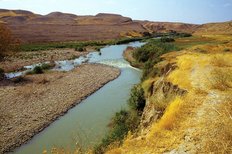 [you can also listen to this and other sermons at http://www.huntingdonstonechurch.org/sermons] Matthew 3:13-17 Jesus' baptism We have so much good news to celebrate today! We enter the gospel story – the good news story, literally, gospel is the Old English word for good news – at the Jordan River. And that is what we find at the river today – good news of a new thing. God’s news of the new thing happening on this historic river. Good God news that we witness and bring to life in this building on this day when we read the story and speak the themes to one another. Today in the book of Matthew John the Baptist is at the Jordan River with some yearning Jews. 1500 years before that, Joshua and the Israelites were at the Jordan River to cross into the Promised Land. That was good news to the Israelites, who had survived famine, slavery, homelessness, and a major identity crisis while wandering the desert. The Israelites crossed the Jordan River to return home to a land their ancestors had lived in a few hundred years earlier until famine sent them to Egypt for food. In the meantime, others had been living in this Promised Land, and they also called this home. In fact, the land was called Canaan and it was, naturally, filled with Canaanites. But the Israelites had been looking forward to the promise of the Jordan River for hundreds of years. In fact the Jordan River is a character itself in the Older Testament – it’s mentioned about 200 times. The river was the promise of life itself, and the Israelites were always talking about living on its banks, and hearing God promise it to them. This river is the border between foreign lands and home. It’s the boundary between the past and the future. It’s a place of abundance and refuge. It’s where Jesus will be baptized, often where he teaches, and where he goes for solace in the book of John soon before his death. It is so important to the Israelites that they tell stories of killing thousands of people to claim the riverbank. While the genocide is wrong, we can relate to this profound longing. We’ve all had the same needs, for refuge, for home, for the promise of life, for the possibility of abundance. Crossing this river may have been so important that the Israelites wandered the wilderness for 40 years just to prepare. See there’s a funny thing about the geography of this story. Have you noticed this before? 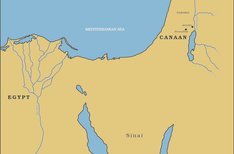 The Israelites escape slavery in Egypt and are returning to Canaan. There’s a pretty clear path between Egypt and Canaan, and it doesn’t involve crossing the Jordan. 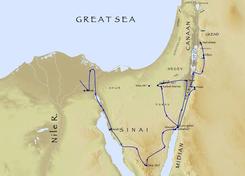 Biblical scholars believe the wilderness wandering took place over here (south of the Jordan and the Dead Sea). 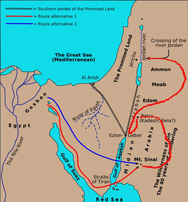 Some scholars think the Israelites used one of these routes: 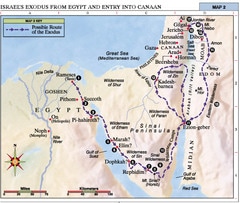 Most draw the map like this. It seems the Israelites passed by their destination and wandered around in an oval, then found a more complicated way to get to Canaan. Is this simply the result of poor planning? No GPS? I doubt it. I think, like every other detail in the stories we read in the Bible, this was a deliberate detour. Whether we ascribe it to God or the people recording the story, the 40 years in the wilderness are someone’s intent. They are a choice. Without these 40 years, the Israelites would never have crossed the Jordan. They still would’ve ended up on its banks, but the moment of crossing over would have been unnecessary. And this story tells us clearly that crossing the Jordan was necessary for this tired, cranky, confused band of travelers. The Israelites have to cross the river because they need a border between the old and the new. Moses, Miriam and Aaron have led them out of Egypt and through the desert, but because they wander around, all three of these essential leaders die and are buried along the way. Moses says many times that he won’t live to cross the river with the people, like in Deuteronomy 4:22 “For I am going to die in this land without crossing over the Jordan, but you are going to cross over to take possession of that good land.” Moses urges the Israelites to remember their faith in God and asks Joshua to lead them across the river. They bury Moses, and soon after, they cross the Jordan and enter the Promised Land. Stone Church doesn’t have to wander 40 years in the wilderness to prepare for the next thing, but we are also in a time of transition. As we move slowly through leadership changes, we’re not lost at all – we’re actively seeking out our Jordan River, discerning through the Discovery process, serving on committees, sharing communion, deepening our relationships with God, self and others nearly every day of the week at one of the many activities hosted by this body. Stone Church is not wandering, and this is no wilderness! God is at work in our body and in each one of our bodies, setting us free from bondage, leading us to nourishment in the midst of famine, raising up new leadership, raining manna from the sky in the form of a sunny January day, and the sweet hugs we get every Sunday, and the audacity of a church that knows God’s love is infinite and at work in our loving. This is plenty of good news – but there’s more! Today we remember that Jesus returns to the Jordan River to do another new thing. Jesus is about 30 years old now, and scriptures barely say anything about him since he was born two weeks ago, and fled to Egypt with his parents last week. But this week he’s 30 and getting baptized. And he goes to the expert – his cousin (according to tradition) John. John’s father Zacharias, the priest, has found a place in mainstream Jewish society. John flees the city’s security and seductions and lives as a hermit in the desert, eating locusts and honey and letting his hair dread. It doesn’t seem like John would be particularly popular, but Jews yearning for spiritual meaning flock to him and he begins baptizing people to symbolize repentance and forgiveness. Some of you were baptized as babies, some as adults, some not at all. In Judaism there isn’t one baptism, the ritualistic full body immersion called the mikveh is used for converting to the faith, before entering the temple, cleansing after ejaculation, menstruation, childbirth and other times to prepare objects or people for religious ceremonies. So what John and Jesus are doing isn’t a brand new thing, but the way they are doing it is not only weird, it is revolutionary. Here’s this wild man in the desert baptizing people not to go to the temple – the center of established religious and political power, but to live the lives they are called to. This is self-selected baptism, not ordered by a priest. And this is baptism with wild John, not an important leader from the Pharisee or Sadducee parties. That’s the power of the Jordan River – or any other border we create for ourselves – when we enter the boundary waters, we are marking a new reality. Like turning the calendar to 2017, we mark a new year, and many of us hope to live anew, to see the world renew. Jesus is a new kind of leader. He doesn’t ascend the mountain to speak to God in secret like Moses. Jesus wades down into the water to be with John and the yearning Jews, joining them in a ritual of repentance and forgiveness. For heaven’s sake I’m grateful to Moses and Miriam and Aaron for leading the Israelites out of slavery, but perhaps there’s a reason they couldn’t cross the Jordan and enter the promised land. It was time for a new way. And 1500 years later Jesus and John enter the Jordan to make another new way. And 2000 years later we are still making new ways, we are still crossing borders, we are still learning how to get close to God by ascending mountains, by descending into rivers, by joining one another in wet repentance and forgiveness, by looking in our own hearts to find God pulsing within us. There are plenty of Christians who struggle with this moment in the good news gospel story, because many of us don’t want to think of Jesus having any sins to repent of. I look forward to hearing what you have to say about that! What I think matters more than Jesus’s sin status is that he chooses to announce his ministry in the company of the folk who gather at the river – far from the temple or the mountaintop. Even John is offended that Jesus comes to him for baptism, saying, “You should be the one to baptize me!” We hear the same shock in Peter a couple years later when Jesus kneels to wash his feet – “no, let me wash yours!” Jesus is here to turn the world upside down, not from a comfy throne or safe distance, but in the mucky river along with the rest of us. He wades in with us in our flaws and failures, in our worries and weakness, in our longings and lapses, in our beloved brokenness. And by asking John to baptize him, Jesus declares the ministry of all followers, and we are called through our faith today to serve one another in the way of Jesus. And God sees it, and calls it good. The good news gospel of Matthew says, When all the people were being baptized, Jesus was baptized too. And as he was praying, heaven was opened and the Holy Spirit descended on him in bodily form like a dove. And her voice came from heaven: 'You are my Son, whom I love; with you I am well pleased.' Our faith ancestors took that story so seriously that they made adult, full-immersion baptism part of discipleship. Wading into the waters to mark a new moment. We’ve just turned the corner into 2017 and we have a wealth of worries, hopes and commitments to choose. As a church we’re living in interim time, in between one era of pastoral leadership and another, and we’re looking around and realizing just how much churches have changed, and how much Stone Church has changed. With the Divine alive within us we are doing a new thing. When we welcome people into the grace and love of God through this community, our church takes shape. When we baptize in this building, we can imagine it is the Jordan River, and pray that the Holy Spirit take flight in this room and take pleasure in the love and service cultivated in this place. Just as God creates and recreates over and over within and among us, we are called to be agile and open in the ways we come together as church. Remember in the Exodus story when the Israelites would get tired of all that walking and waiting and say, “Can’t we just go back to Egypt? At least we had work to do and food to eat.” It’s absolutely natural to long for the familiarity of the past, whether it’s pining for the Good Old Days when the church was the center of the community, or looking back on an era when politicians had integrity. I think the Good Old Days are never as good as we believe – our memories tidy things up and leave out nuance. Really – did we ever have enough time? Did we ever trust leaders? Maybe for a season…. Our faith and our convictions call us away from rose-colored-glasses turned to the past. We are called to step forward into the unknown. And the Jordan River reminds us that we shouldn’t get too comfy, because we can’t step in the same river twice. That was true when Heraclitus said it 2500 years ago, it will be true long after we are all gone. 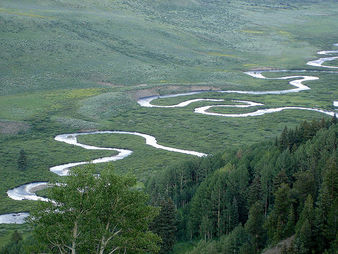 And yet – Heraclitus could dip his toes into the Cayster River in his hometown of Ephesus, and we could travel to Turkey and put our toes in the Cayster River tomorrow. The river is always changing, the water is always new, and still we can return to its banks and call a familiar name. God is like that. We can translate names into any language – Cayster River is also Kaystros River or Kucuk Menderes or Scamander – the little meanderer. All these names are our best attempts to describe something both constant and ever-changing, something familiar yet always new. The names God, or Holy Spirit, or Creator are like that, too. As we lean into this new year, as we journey through transition in our bodies, our families, our workplaces, our church, our town, our country, our culture, our world, may God’s grace shower you, may God’s love buoy you, may you find strength in the Ever-Constant-Holy-One. May you find renewal in the Ever-Flowing-Creator, who makes all things new.
1 Comment
Cynthia
5/21/2018 10:27:05 am
I love studying about the Exodus, but I find that most maps don't line up with what I read in scripture. It says that they came out of Egypt. The Sinai Peninsula was part of Egypt, so why do maps show them wandering around there? From childhood, I knew that it was ridiculous for them to have to cross the Jordan River to enter the land. The bible clearly says they were in Midian. Just because they have traditional names for geographical locations don't make them correct. Kadesh was probably near Petra. The map you have on this web sight looks more like what I believe the wanderings were like than any I've seen. We get too married to tradition to consider taking truth into account. Thank you for your map!
Reply
Leave a Reply. |
Archives
January 2022
|
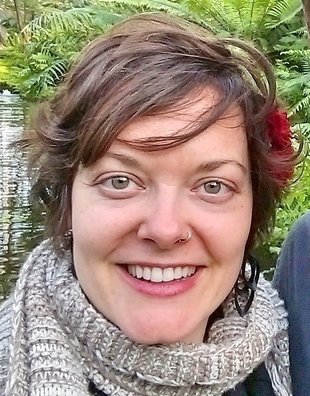
 RSS Feed
RSS Feed